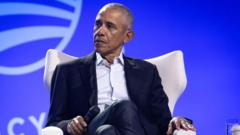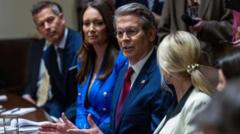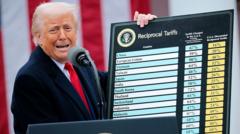The ongoing confrontation between the Trump administration and Harvard University escalates, as the latter stands firm against demands regarding diversity hiring and anti-Israel protests. The implications could affect other U.S. institutions, with Columbia University now taking a more assertive stance.
Harvard vs. Trump: A Clash Over Academic Freedom and Funding

Harvard vs. Trump: A Clash Over Academic Freedom and Funding
President Trump intensifies his conflict with Harvard University, threatening to revoke its tax-exempt status amid disagreements over diversity policies and political protests.
In a dramatic turn of events, President Trump has targeted Harvard University by freezing $2.2 billion in federal funding and warning of possible revocation of its tax-exempt status. The longstanding feud between Trump's administration and the prestigious Ivy League school has highlighted broader tensions between government policies and academic freedom.
Despite the financial threat, Harvard remains resolute in its refusal to comply with the administration’s demands regarding the university’s diversity hiring practices and its response to anti-Israel demonstrations. With an endowment of $50 billion, Harvard is well-equipped to withstand the pressures from the White House, reinforcing its commitment to academic independence.
The confrontation has sparked a ripple effect across U.S. universities, encouraging institutions to uphold their autonomy in the face of governmental demands. Notably, Columbia University’s acting president has publicly pledged that the institution will defend its independence, taking a firmer stance than before in response to governmental pressures.
Critics of the Trump administration argue that this campaign against Harvard is part of a broader assault on academic freedom across the nation. As tensions continue to escalate, the implications of this conflict could resonate far beyond the walls of Harvard, impacting the policies and governance of universities throughout the country.






















